- Home
- Tad Williams
The Dirty Streets of Heaven Page 4
The Dirty Streets of Heaven Read online
Page 4
Why did God make me so restless, so difficult? I’ve never understood it, but He must have wanted me to be that way, because He gave me enough for two.
As usual, when I woke up in my physical body once more it felt a little strange to me, as if someone had washed and ironed a favorite old pair of jeans. I put some coffee in the microwave—it’s strange how much like a real body mine is in terms of its needs and crotchets—and went to the mirror while waiting for the ping.
Same face. Had it for about five or six years now. Not much different from the two or three faces before it, either. It would take an expert to know I’d changed. Same body, too—average height, average weight, maybe a little wirier and more athletic than your average guy. The man in the mirror had dark hair that needed cutting, a face (ever so slightly Mediterranean or dark European) that needed shaving, and a mouth that would have been sad and artistic if it weren’t for the smile, which, although it doesn’t show up often, I’ve been told can be slightly alarming. I wondered, as I often do, if this is how I looked in life. If so, nobody’s ever mistaken me for me, if you know what I mean, but that would be quite a coincidence, I guess, to assume I’d run into anyone on Earth who might have known the old me. I might have lived in the seventeenth century for all I can guess, or wore a powdered wig and took snuff. Or I could have been a Chinese peasant. I might have been a woman, too. Could have been anybody. So why did they take that away? Why does Heaven treat souls as if they were old videotapes, erasing the priceless memories of a graduation or wedding just to record an episode of some sitcom over it? Not that I’ve got anything against situation comedy, but if we don’t get to remember what we did with our lives—even if for most of us those lives probably sucked—why did we have to go through it in the first place?
These were my mirror thoughts. Pretty ordinary for me.
Cynical, they say. Not trusting. Bad angel!
But like I said, God must want me to be this way. Either that or He just doesn’t give a shit. To this point, I’m staying hopeful.
They were decorating Beeger Square that afternoon for the last thrash of Carnival season, which would kick off this weekend. San Judas does love its Carnival. The light poles were strung with tinsel and hung with big, scary-looking masks, and the city workers had built a temporary stage in one corner of the square—fortunately the farthest one from the Alhambra Building, where we all hang out. The folks at The Compasses hated to be distracted by amateurs.
The bar is called The Compasses because about a hundred years ago, before they turned the Alhambra into the first skyscraper in San Judas, the site of our contemporary oasis had been a fourth-floor room in the old Alhambra Theatre that the Masons had used as a meeting lodge. A stone plaque with the Square and Compasses, the symbol of their order, still hung over the front door of the building.
“But all the squares are outside,” as Sam liked to say. “So we only need the compasses.” And that’s how it got its name.
It was a slow day inside. The only regulars I saw were Sweetheart and Monica Naber at the bar watching CNN on the wallscreen and Chico the bartender polishing glasses, as usual looking about as warmly human as a statue of Lenin.
“Ooh,” Sweetheart said when he saw me come in, “I can smell the grumpiness from here, honey.” Sweetheart is built like an NFL defensive tackle but he’s as camp as a Brazilian soap opera, one of the few of us earthbound who really seems to enjoy life. “Bad time at headquarters?”
News travels fast at The Compasses. “Not really. Just the usual supervisorial jerking-around.” In fact, the whole Clarence thing worried me enough that I didn’t want to talk about it with anyone except Sam.
Sweetheart nodded. “I hear you, sugar. I never go near the place if I can help it—all that muted splendor makes my eyes itch.” He grinned. “Got any plans for Carnival? Are you coming to my party? ‘Cause you can’t let Carnival go by without dancing, sweetie!”
I sometimes think Sweetheart has gone a bit native.
Monica looked up when I slid onto the stool next to hers. Chico, who was always eager to avoid conversation, edged away to give us some privacy.
“Hey,” she said. “You look rough. Stairway to Heaven?”
“It’s not the lyrics that make it so good, it’s the guitar solo. But yeah. Just got back.” I was curious if she knew anything about the kid but I didn’t want to give out too many particulars about what the Mule had said. “Where’s Sam?”
“And his trusty sidekick Mini-Sam? Haven’t seen them yet. Sanders and Elvis have some kind of bet going about how fast an armadillo can run so they took off about half an hour ago for the zoo. Kool’s got a client over in Spanishtown. Things have been slow. I blame clean living.” She looked at me a little funny, perhaps wondering why I was sitting next to her making friendly chat. See, Monica and I had been through a little thing together not too far back and some of the skin was still raw, if you know what I mean. Long story. But she was naturally suspicious of my intentions. Hell, I’m naturally suspicious of my intentions most of the time.
“Speaking of the kid,” I said, “they say he comes straight out of the Halls of Records.”
She laughed. “And you want to know if I’ve heard anything about that? Sorry, Bobby. What do you care, anyway? They didn’t stick you with him.” She stood up. “Any requests?”
For a moment I thought she was going to sing or something, then I saw she was headed for the jukebox. “Nothing that will make my head hurt.” I watched her walk across the room. Nice shape. We call her Monica because she’s dark-haired, cute, and a bit a bit of a bossy group-mom, like that character on Friends. Naber…well, that’s because it’s hard to say “Nahebaroth” properly without making your throat sore. She’s a good person, except her taste in men is appalling, me being the prime example. I was told by another female friend once that when I get morose it’s “like being around a grumpy cat—you’ll let someone feed you, but Heaven forbid anything more.” And we were doing pretty well at the time she said it.
The bar fell into an unexpected moment of silence as the antique jukebox clicked and hummed, then the record was flipped onto the turntable and the needle dropped. I used to think of The Compasses’ jukebox as a metaphor for how every soul in God’s Kingdom mattered, but I’m not certain any more that the conceit really works.
As Monica strolled back through the mostly empty tables, Steely Dan’s “Haitian Divorce” began to honk its way through the introduction. Naber had a little sway in her walk. I suddenly realized that I hadn’t been seeing Naber suspicious, I’d been seeing Naber flirtatious, but I’d forgotten what it looked like. She’d been on that stool for a while, drinking mai tais or some other godawful tropical poison, and that meant she was liable to do something dangerous. Extremely liable.
“What are you looking so miserable for, anyway?” she asked as she slid in beside me, still moving to the music. “Jeez, B, if you’d cheer up a little something nice might even happen to you tonight.”
Frisky and nostalgic. Things were about to get really complicated. We’d had a great time together for a while, but it ended in a protracted firefight of name-calling and running-for-the-hills—the former her, the latter me—so there was no way in hell I was going to start anything up again unless I was real drunk and real stupid, and I hadn’t had a drink yet that night.
Then, just that moment, as if to prove that the Highest still loved little Bobby Dollar very, very much, my phone started buzzing in my pocket.
Monica looked down at my vibrating pants. “Somehow, I don’t think that’s because you’re happy to see me.”
“Gotta take it. It’s work.”
“You go and get some, honey!” Sweetheart shouted. I’m not sure what he meant.
“Shit,” I said, staring at the screen. “Alice says this should have been Sam’s, not mine, but she’s passing it on to me. Looks like I’ve got a date with old money.”
Monica did her best to look amused, but I could tell she was disappointed
, which made me more than nervous. When did she decide I was anything but another guy who’d messed her up? If Monica had decided to forgive me—to forgive me with benefits, even—it was going to make The Compasses a bit hot for me.
“Is it Woodside?” she asked. That’s a place in the hills at the edge of the city where the horses have more rights than most human beings.
“Nope, down in the flats. Palo Alto district.”
She sighed and sat up, pulled her drink into closer range. “Break a leg, then. No, I’m feeling generous—break both.”
I left Monica nursing her drink, looking vaguely sad. I think that phone message saved us both from a lot of bad luck. Well, at least her. As you’ll see, it was a different story for me.
I tease Sam about his boring company ride, but to be fair, there are a few benighted souls who remain unimpressed by my custom ‘71 Matador Machine, despite its handsome copper paint job and checkered interior upholstery. In fact, someone (it might have been Monica Naber) once referred to it as “a car for under-endowed teenagers.” To each their own. I know what I like, and one thing I like about the Matador is that I could smash that beast into a tank at sixty and not even stall the engine. I prefer a stout piece of machinery around me. Dying is never fun, even the third or fourth time.
At that time of the day in San Judas it’s a lot faster to take surface streets than the freeway. Twenty minutes later, give or take, I was cruising east down University Avenue through a genteel, greenery-shrouded district where even the palm trees had their own physicians. (I’m not lying. The Palo Alto Neighborhood Association hires specialists to climb them once a month to check them for nut-rot or whatever.)
The main drag was lined with expensive apartment buildings but behind them lay the real neighborhood—if by “real” you mean “million dollar down payment, minimum,” where people such as rich Stanford alums and old-school corporate big shots lived and enjoyed their money in quiet surroundings. (The newer, younger Silicon Valley money tended to wind up in flashier parts of the city, like townhouses around one of the public squares, Atherton Park, or out at the Shores.)
The mansion in question stood on one of the winding side streets, a mock Tudor with half an acre of lawns and hedges. Two SJPD cars and an ambulance were already parked in the long driveway and the garage door was open. A couple of guys in paramedic outfits with oxygen masks were just removing the body from the car inside the garage, a late model piece of expensive overseas engineering. I got a glimpse of the deceased as they pulled him out—white haired Caucasian guy, trim, wearing a dressing gown and pajama bottoms. His skin was a lovely fuchsia pink, classic symptom of carbon monoxide poisoning.
Well, it sure looked like suicide.
I summoned a Zipper and stepped through. Everything seemed to change just a little—the angle of the sun, the quality of the light—and the cops and paramedics all stopped moving at the same time, as if they were playing a kids’ game. I wandered over to the car to look at the deceased’s face. It seemed familiar. I might have met him somewhere, or he might have been in the newspaper. I turned and found the hovering glow of the late Mr. Monoxide’s guardian beside me.
“Doloriel,” I said, starting introductions.
“Yurath,” said the glow.
“Who is he?”
“Don’t you recognize him?” Little Yurath seemed a bit anxious, bobbing like a firefly in a strong breeze. Of course, its job of several decades was just about to end. Yurath might even have liked the guy. That happens sometimes. “Edward Lynes Walker. Founded a bunch of companies, including one of the biggest in Northern California. Philanthropist. Community leader. They even named a satellite after him.”
“Sadly, he’s still just as dead,” I pointed out. “Okay, so everyone loves him. Any reason this shouldn’t be a slam dunk for our side? Besides it being a suicide, I mean?” The rules on offing yourself have loosened up a bit. If Yurath could provide me with even the slightest history of painful medical problems or serious emotional trauma I was pretty sure the way Walker went out wouldn’t hurt our case too much.
“I can think of at least one reason,” the guardian said. “Look behind you.”
I could already feel him, but I turned and pretended to be surprised. “Prosecutor Grasswax. Goodness, this is my lucky week! Two days in a row! And Mr. Howlingfell—say, that’s a nasty bruise on your throat.”
Howlingfell just balled his fists and looked away but Grasswax showed me all his teeth. It took a while. “Doloriel. I’m sure you and your friends sat up late last night celebrating your victory.”
“Nope. I went home early, then visited old friends. Not that it’s your business.”
Grasswax leaned forward. Even Outside, where there was no air in the normal sense, his breath was like standing downwind from a slaughterhouse. “You like to make jokes, don’t you, Doloriel—no, Bobby Dollar, isn’t that what they call you at…what is it? The Compasses?” He said the bar’s name as if it tasted bad. “You must have found it very amusing when your little clot of an apprentice made me look bad in front of one of the Principalities.”
Anybody else that disgusting and standing that close to me would have got slugged, but you just don’t take a swing at one of Hell’s official prosecutors. Keeping the balance between the two sides is very, very delicate and the rules of what we do make it clear that loss of control is no different than going renegade, so I did my best to breathe through my mouth. “He’s not my apprentice, Grasswax, and I didn’t have anything to do with that. Let’s just get on with business. I’ve got no quarrel with you.”
He gave me a long look that actually made my skin itch. “If you say so.”
“But that’s the problem!” It was Yurath, the guardian, still bouncing around like it had to go to the bathroom—which, believe me, is not a problem guardian angels have. Its voice was unpleasantly shrill. “How can we? We can’t!”
Grasswax rubbed his fingers on the lapels of his magma-colored suit as though even talking to such a low-ranking angel left something unpleasant on him. “What are you talking about?”
“Where is he?” squeaked Yurath. “Where did he go?”
“What?” Grasswax looked around at the tableau of frozen police and unmoving paramedics. “Who?”
It suddenly hit me. It hit me hard. “The deceased,” I said. “He’s talking about the deceased. Walker’s not here.”
And it was true. The gurney containing Walker’s body was frozen on its way to the ambulance, but the man’s soul—the permanent, immortal portion of Edward Lynes Walker that was our particular responsibility—was nowhere to be seen.
There’s not a lot of territory Outside to search when you step through a Zipper. The farther you get from the egress, the less real it becomes until eventually it’s just gray nothing. Nevertheless, we all searched carefully, even Grasswax, but the timeless bubble we inhabited was unquestionably short one soul.
“Oh, for God’s sake,” I said with real feeling, making the guardian flutter in distress. “Oh, sweet Jesus.” This had never happened before—not to me, not to anyone as far as I knew. My so-called lucky week had just gone fully thermonuclear.
Grasswax swore too. I don’t remember exactly what he said, but I remember being impressed—they can really curse in Hell. In fact, if I hadn’t been so damn terrified at that moment I would have written some of it down.
three
different than sunday school
“WHAT KIND of crude, stupid trick…?” Grasswax happy would have been unpleasant; Grasswax angry was a lot worse. For one thing, he was bubbling out the slits in his cheek. “You think you can humiliate me twice in two days? I don’t care how far up I have to go or how many ladders I have to shake, Doloriel, I’ll see you skinned and screaming for this!”
Do not strike even the most deserving members of the opposition, I reminded myself, especially prosecutors, who will purposefully incite you—that is the stuff of which interhierarchical incidents are made. Right out of the advo
cate’s manual. “I didn’t have anything to do with this, Grasswax. I got here when you did!”
“Souls do not simply disappear.”
“I didn’t say this one did. I just said it wasn’t here. Probably just some minor screw-up.”
“Minor screw-up?” The prosecutor was practically shrieking. Red froth flew through the air. “Pearl Harbor was a minor screw-up—this is a problem!”
He was right, of course. Things like this didn’t happen. Ever. “Okay, okay, you call your supervisor, I’ll call mine. We’ll get it all straightened out.”
But even before the words were out of my mouth angels and demons started popping out of the air on all sides, more Zippers opening than half-price night at the Nevada Cottontail Ranch. Security had been breached bigtime, and now the emergency troops were showing up. This wasn’t just a problem, I realized, it was an actual, honest-to-front-office crisis, and yours truly was stuck right in the middle of it.

 God Rest Ye Merry, Gentlepig
God Rest Ye Merry, Gentlepig Tailchaser's Song
Tailchaser's Song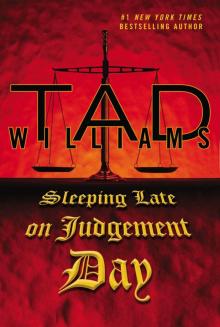 Sleeping Late on Judgement Day
Sleeping Late on Judgement Day Stone of Farewell
Stone of Farewell The Dragonbone Chair
The Dragonbone Chair Sea of Silver Light
Sea of Silver Light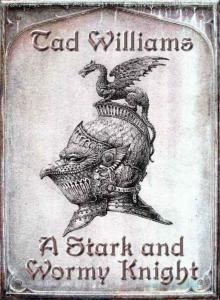 A Stark and Wormy Knight
A Stark and Wormy Knight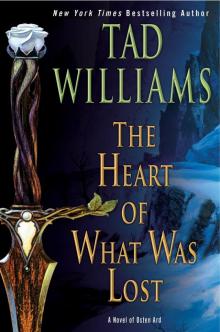 The Heart of What Was Lost
The Heart of What Was Lost Diary of a Dragon
Diary of a Dragon Last King of Osten Ard 02 - Empire of Grass
Last King of Osten Ard 02 - Empire of Grass To Green Angel Tower, Volume 1
To Green Angel Tower, Volume 1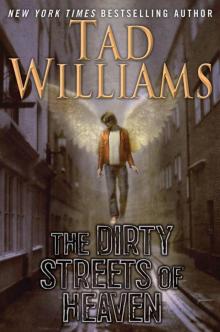 The Dirty Streets of Heaven
The Dirty Streets of Heaven River of Blue Fire
River of Blue Fire The Very Best of Tad Williams
The Very Best of Tad Williams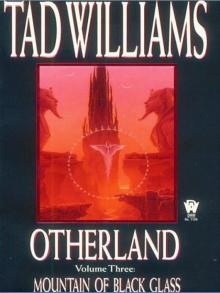 Mountain of Black Glass
Mountain of Black Glass Empire of Grass
Empire of Grass City of Golden Shadow
City of Golden Shadow Happy Hour in Hell
Happy Hour in Hell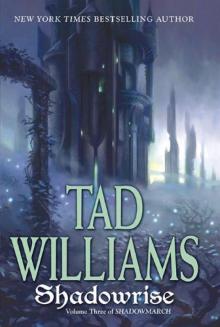 Shadowrise
Shadowrise Shadowmarch
Shadowmarch Brothers of the Wind
Brothers of the Wind Shadowheart
Shadowheart Bobby Dollar 02 - Happy Hour In Hell
Bobby Dollar 02 - Happy Hour In Hell The War of the Flowers
The War of the Flowers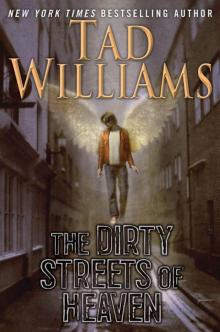 The Dirty Streets of Heaven bd-1
The Dirty Streets of Heaven bd-1 Tad Williams - The War of the Flowers (retail) (pdf)
Tad Williams - The War of the Flowers (retail) (pdf) Shadowheart s-4
Shadowheart s-4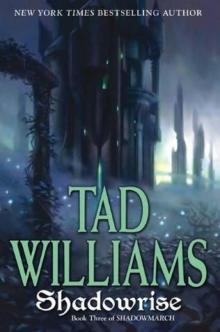 Shadowrise s-3
Shadowrise s-3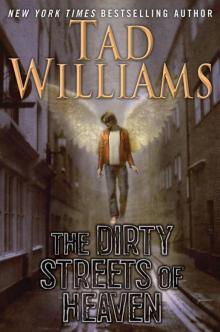 The Dirty Streets of Heaven: Volume One of Bobby Dollar
The Dirty Streets of Heaven: Volume One of Bobby Dollar The Stone of Farewell
The Stone of Farewell (Shadowmarch #1) Shadowmarch
(Shadowmarch #1) Shadowmarch The Secrets of Ordinary Farm of-2
The Secrets of Ordinary Farm of-2 Shadowmarch s-1
Shadowmarch s-1![Bobby Dollar [04] God Rest Ye Merry, Gentlepig Read online](http://i1.bookreadfree.com/i1/04/06/bobby_dollar_04_god_rest_ye_merry_gentlepig_preview.jpg) Bobby Dollar [04] God Rest Ye Merry, Gentlepig
Bobby Dollar [04] God Rest Ye Merry, Gentlepig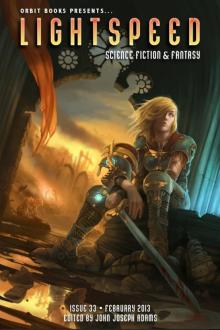 Lightspeed Issue 33
Lightspeed Issue 33 Sea of Silver Light o-4
Sea of Silver Light o-4 The Dragons of Ordinary Farm of-1
The Dragons of Ordinary Farm of-1 Shadowplay s-2
Shadowplay s-2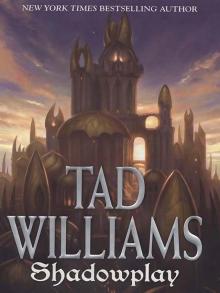 (Shadowmarch #2) Shadowplay
(Shadowmarch #2) Shadowplay